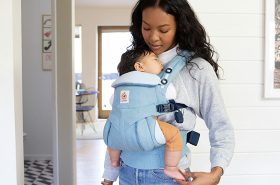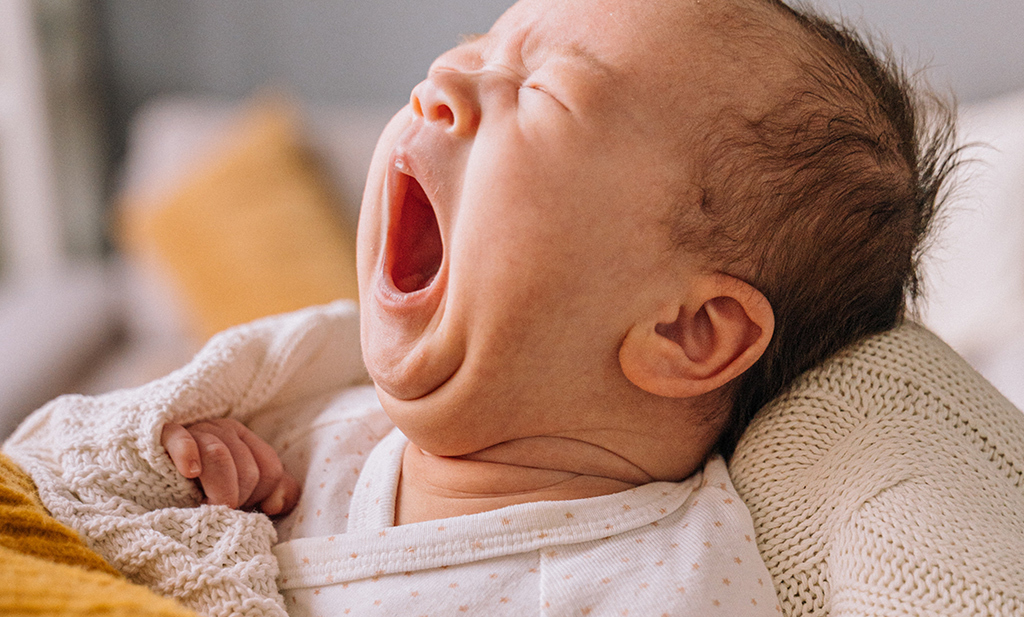
Why does my baby keep waking up every hour or two? How much sleep does a baby need? When does baby sleep finally start to get better? And of course, when do babies sleep through the night? As a midwife, our expert Katrin Ritter receives a lot of questions about sleeping. Read on below for her answers to your most asked baby sleep questions.
Why is baby sleep so important?
Sleep is a very individual matter and only works with relaxation. As your baby has a lot of developmental work to do in the first year of life and is growing rapidly, baby sleep naturally changes too. In the first months, your baby first must adapt to the world outside and learn what gravity, eating, digesting, sleeping and being awake mean. At some point babies/children learn that waking up at night is quite natural and that you can just go back to sleep. However, in the beginning they need their parents’ help to do this. Later on, children learn to regulate themselves more and more and can continue sleeping on their own when they wake up during the night. To do this, however, they need to feel safe and secure.
If you know how baby sleep works and how you can specifically support it, you will be more relaxed and so will your baby. It is important to know that sleep is not only a physical state of rest, but also a highly differentiated functional state of the brain. During sleep, body and mind regenerate, the day’s impressions are processed, the immune system is strengthened and learning processes are made possible. Have you ever noticed that your child, when it is just learning to walk, sleeps more restlessly at night? This is a sign that the newly learned material is being processed. And without sleep, it would not have the opportunity to do so.
How does baby sleep develop?
At the beginning of life, your baby’s neuronal networks are still immature. That is why infant sleep is very susceptible to disturbances and is unstable. To control the regulation between sleeping and being awake, the brain must perform complex tasks. Acoustic stimuli, social contact and regular food intake at certain times are important so that your baby experiences structure. In the first year of life, however, baby sleep changes very frequently. You may think that everything is going well – and then your baby is awake more often. Only when babies mature and develop do their sleep structures change and a circadian rhythm (internal clock) develops – just like in adults.
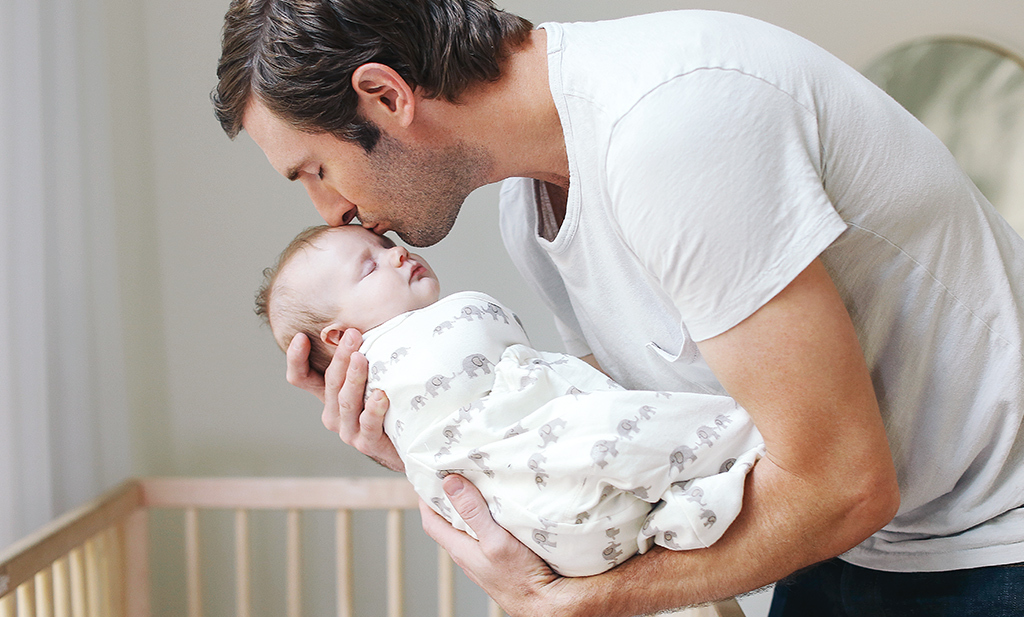
Why is my newborn baby crying instead of sleeping when they’re tired?
A newborn baby first must learn what the right solution is for their respective feelings and problems. They learn that eating helps with hunger, that a new nappy helps with that uncomfortable feeling on their bottom and that sleep is the right solution for tiredness. At first though they don’t know that this is the right solution, so a newborn baby crying is their method of communicating their discomfort to you. That’s why you as parents are crucial as co-regulators: no one knows your baby better than you and knows what it needs right now. Watch for your baby’s cues and answer them promptly, according to their needs and development, where possible before your baby starts to cry. Because if they’re crying, they can’t be relaxed, and so they can’t sleep. You’ll need to calm baby down before they’ll be able to fall asleep.
How much sleep does my baby need?
In the first three months of life, you can expect 15 to 17 hours of sleep within 24 hours. Your baby takes several naps a day, has 30 to 90-minute waking phases – for feeding, for example – and several times a night. Over time, the waking and sleeping phases change. You can find a detailed table and more information on this topic here. But please always remember that every child is different, and everyone sleeps as much as they need.
Why doesn’t my baby want to sleep?
Why your baby doesn’t want to sleep can have different reasons. If your baby is not tired enough, then try to increase the waking window before sleep. During their waking time, a sleep pressure accumulates, which is reduced again during sleep. As the sleep pressure increases, so does the readiness to fall asleep. Important: newborns do not yet develop a sleep pressure that makes it easier to fall asleep; they feel uncomfortable, agitated, and fall asleep less easily. Therefore, you should not keep very small babies awake artificially. Here’s some guidance on age-appropriate wake windows (see table).
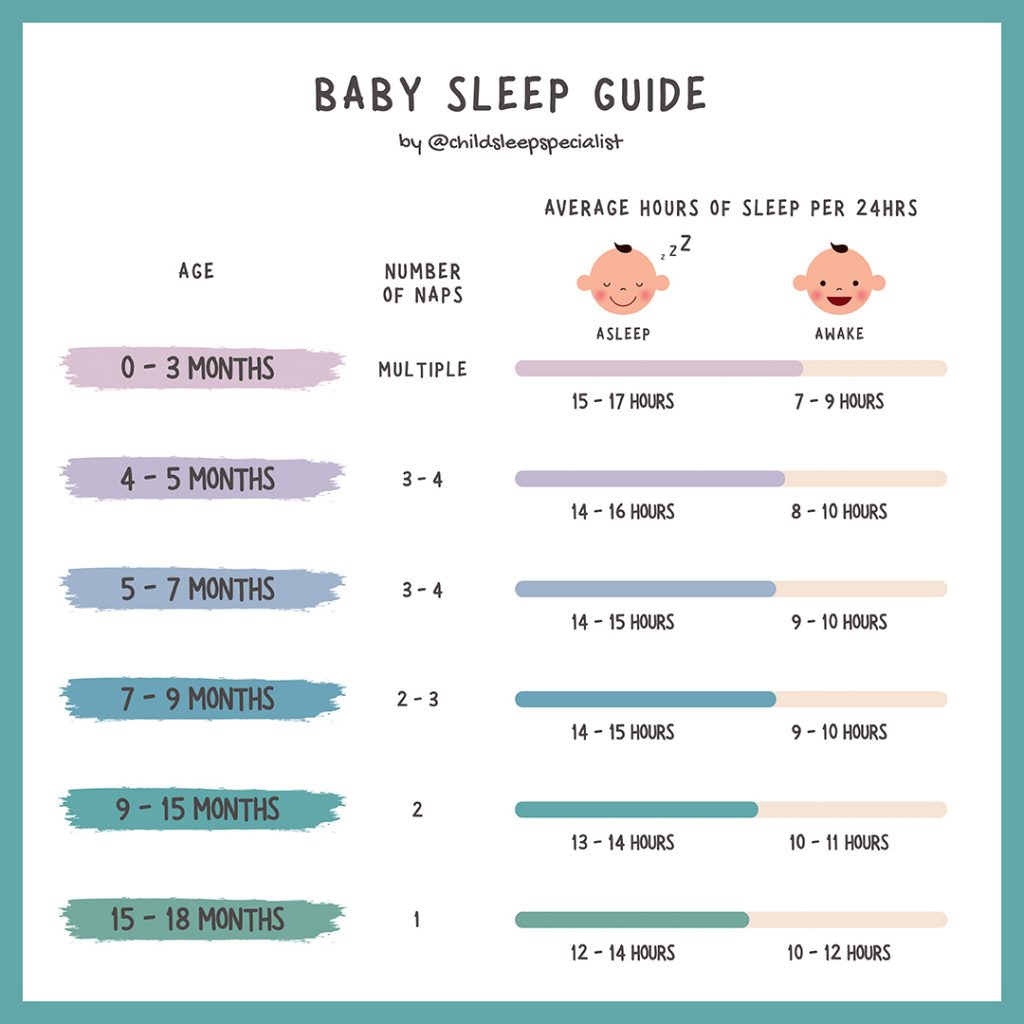
If, on the other hand, your baby is too tired or overtired, they will get an additional energy boost as they are flooded with adrenaline. In that instance try to reduce the waking window before sleep. If this doesn’t help? Then look at your sleep routine. Do you have clear steps that you always repeat? This helps children to make the transition from day to night more easily and to fall asleep. More about this in the next question.
What helps my baby to fall asleep? What is a newborns sleep routine?
A reliable routine for falling asleep with always the same procedures helps your baby to calm down more easily. Any age baby, including a newborns sleep routine, could include things like not talking too loudly for some time before bedtime, reducing stimuli and dimming the lights, for example. Reading a story, taking a relaxing bath, changing their nappy, and putting on a sleeping bag are also part of this. It is recommended to do this routine 15 minutes before a nap and up to an hour before bedtime.
Why does my baby keep waking up every hour or two?
One of the most difficult things for new parents to adapt to is the sleep deprivation that comes with a newborn. Babies sleep doesn’t work like ours so parents often ask themselves is why does my baby keep waking up every hour or two? For babies, a sleep cycle lasts about 45-60 minutes, for adults about 90-120 minutes. We also wake up when this period ends, but we just turn over and continue to sleep. A baby cannot do this so needs proximity to their parents. Babies also have many dream phases that can disturb sleep. As a result, they only sleep superficially and are easily woken up, they breathe more irregularly and are restless. In the first few weeks, the baby wakes up every hour, shows that it is awake and needs to be soothed or nursed/fed by a caregiver. Later on, parents help their older babies to continue sleeping, by doing things like rubbing their back or giving them a dummy. A soft, slow voice can also have a calming effect.
At 6 months, babies wake up after 30 minutes and at 12 months after about 45 minutes. This means that baby sleep in the first year of life is exhausting. With newborns, the focus is on breastfeeding and weight gain. Including at night. This means that for the first three months you are in a state of emergency and should grab sleep wherever you can. Lean on your village and/or partner if you have one. As soon as their weight gain has settled well and breast/chest feeding is well established if that’s how you are feeding baby, the intervals between night feedings can become longer.
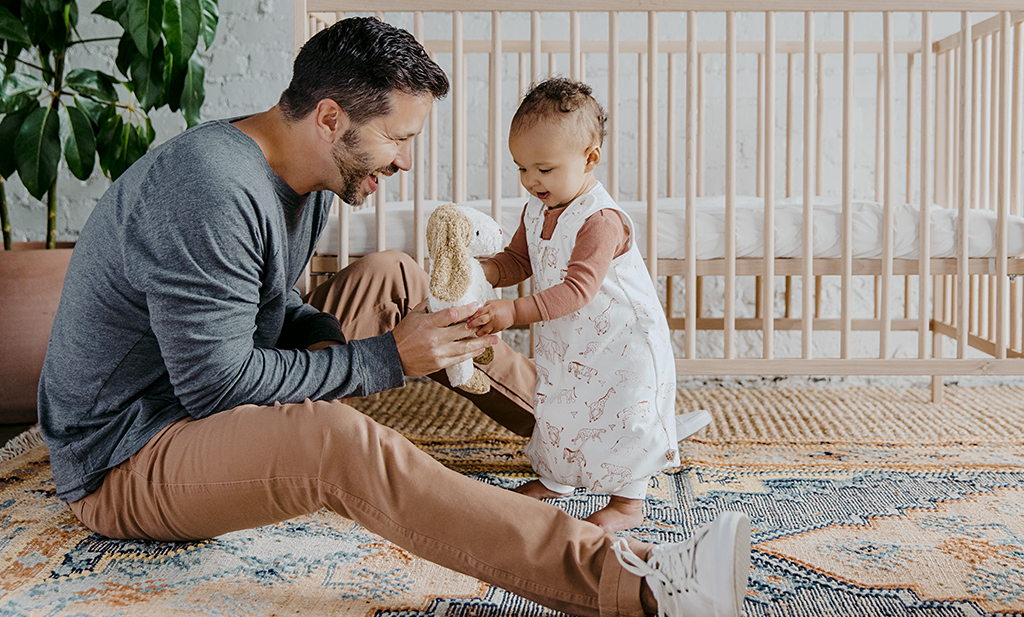
What to do about restless baby sleep?
As you can see, there are several reasons why your baby wakes up at night – some are developmental, some are habitual, and most are completely normal. Here you can find out more – and what you can do about each reason.
How can I tell if my baby is tired?
Depending on the age of baby, typical signs of tiredness are: crying, zoning out, rubbing of the eyes, increased restlessness, decreased activity, yawning, pulling of the ears etc. You’ll soon learn what your baby does to show you they’re tired.
When do babies sleep through the night?
There are lots of different definitions for sleeping through the night. We talk about sleeping through the night when the baby manages to string together several sleep cycles and fall asleep again on its own. So, when do babies sleep through the night? Exactly when this happens is very individual. That is why there is no general answer to this question. From about six months, many babies sleep for several hours at a time. However, there are also children who sleep through the night earlier and also children who only sleep through the night when they are toddlers or beyond. If you’re unsure whether your baby’s sleep is okay then speak to your midwife or health visitor.
Why won’t my baby sleep in its bed during the day – only on me?
Newborns and small babies always prefer sleeping with mum and dad during the day at first, because we are a carrying species and nature did not intend them to be put down somewhere while we go away. Their understanding of “object permanence”, i.e. your baby knows that you are still nearby and alive, even though you are not in the room, only develops at around 9-10 months. Before that, being separated from you is frightening. That’s why sleeping in your arms, in a carrier or, for some babies, in a mobile cot that is close to you works well. The older your child gets, the more the fixed naps during the day and at night will be shifted to the bed (fixed sleeping place) or the carrier (morning/early evening nap if you’re out and about or the last nap is the one they fight most) and you will develop more routine.
When is it time to switch from a bassinet / baby nest to the baby cot?
You can use a bassinet or baby nest for as long as your baby fits in it or your baby does not roll. If you have enough space, a wonderful option is to build a family bed from the beginning (everyone has their own mattress), of course in such a way that your baby cannot fall out or down the cracks. You can also attach some cots to your bed and thus have a larger extra bed that you can use for longer. No matter what you like and what fits in your bedroom, having the baby or child close to you is often the best and easiest solution for everyone – until they move out on their own. This is usually the case around the age of 4 to 6 months. Always remember that the closer you bond with your child and the more security you give them, the sooner they will become independent and self-confident. If you want your child to sleep in their own room, you should ideally only move them out when they are able to continue sleeping on their own at night, at the earliest when he or she is 6 months old.
When do babies sleep through the night – answered! But I have other questions!
Hopefully by now it’s clear that as with most things, all babies are different so the answer to lots of baby sleep questions, including things like why does my baby keep waking up every hour or two and when do babies sleep through the night isn’t always straightforward. If we haven’t answered your question then look at our blog under the category Baby Sleep. You’ll find lots of other exciting information about early childhood development, valuable sleep aids and baby sleep in the first year of life. And if you still have questions, feel free to contact us by email or on social media.
——–
Source: Babyschlaf, Dr. Daniela Dotzauer, Mabuse-Verlag,


